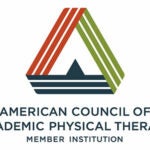Mission
To provide contemporary physical therapy education; to empower graduates and educators to exemplify excellence in clinical practice, scholarship, mentorship, leadership, and professionalism; and to engage all stakeholders in employing evidence-informed physical therapy that reflects and expands best practice.
Vision
To embody and exemplify each of the attributes we seek to instill in our students and to graduate Doctors of Physical Therapy who will serve diverse populations as autonomous primary care practitioners, leaders in the profession, and facilitators of learning through preservation, discovery, synthesis, and dissemination of knowledge.
Philosophy
Physical therapy is a health profession whose primary purposes are the diagnoses and management of movement dysfunction, prevention of the onset, symptoms, and progression of impairments, functional limitations, and disabilities, enhancement of physical and functional abilities, and promotion of optimal human health, wellness and quality of life as related to movement and function. This is achieved through the application of scientific principles through evidence-based practice to prevent, examine, evaluate and intervene in order to alleviate acute or prolonged movement dysfunction and optimize function.
Implicit in this definition is the need of the physical therapist practitioner to assume a number of important roles such as: primary care provider in a challenging health care environment, diagnostician of movement dysfunction; interventionist when applying treatment techniques to restore function; teacher of patients and families; motivator when working with patients and communities to promote optimum health and wellness; team leader and/or participant dependent on the needs of the team and the problem at hand; and a patient, professional and community advocate. In order to fulfill those multiple roles to the highest level, the physical therapist must be committed to service to the profession and the community, dedicated to lifelong learning and the pursuit and application of new knowledge, and devoted to seeking excellence in every avenue of their lives.
Therefore, a physical therapy program must pursue an educational process that seeks to help students develop the knowledge, skills, attitudes and behaviors necessary to become proficient in these various roles. The program administration, faculty and staff become role models and guides in the educational process, and a partnership forms between faculty and students in the quest for professional excellence. The faculty accepts the responsibility of emulating professional attitudes and behaviors, and providing leadership to students, and the student accepts responsibility for their own professional growth and development.
We believe the Marshall DPT Program will successfully prepare graduates capable of assuming the myriad of roles implicit in the profession of physical therapy. We believe that with the concerted efforts and support of multiple stakeholders, we will graduate thoughtful and responsible practitioners who will be advocates for the patient, the profession, and the community, and will be capable of assuming responsibilities for addressing the health care needs of a culturally diverse society.

